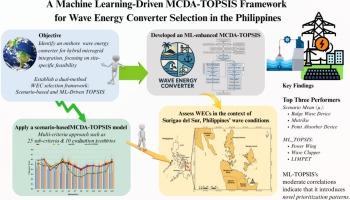A machine learning-driven MCDA-TOPSIS framework for wave energy converter selection in the Philippines
IF 4.9
2区 工程技术
Q2 ENERGY & FUELS
引用次数: 0
Abstract
Wave energy is a promising yet underutilized resource for archipelagic nations such as the Philippines. Wave energy converters hold significant potential for diversifying renewable portfolios. This study introduces a hybrid Multi-Criteria Decision Analysis framework that couples scenario-based TOPSIS with machine learning-derived weights to reduce subjectivity and improve robustness in prioritizing WEC technologies for microgrid integration. The framework is applied to two datasets: Set-1 (general WEC types) and Set-2 (coastal-compatible onshore devices). Scenario-based TOPSIS evaluates ten scenarios with different normalizations and weighting schemes, while ML-TOPSIS derives criterion weights from scenario-based closeness means using eXtreme Gradient Boosting (XGBoost). Validation employs leave-one-out cross-validation with bootstrap confidence intervals, and rank agreement is tested using Spearman's ρ, Kendall's τ, and Top-k Jaccard overlap. Results show that scenario-based rankings remain coherent under balanced and techno-economic weights, whereas entropy weighting yields less stable outcomes. ML-TOPSIS aligns with the scenario-based signal without replicating. Learned importances emphasize cost, efficiency, technology readiness, and deployment feasibility, enabling transparent and adaptive weight generation. Across methods, Bulge Wave, OWC, and Point Absorber Devices (Set-1), and Power Wing and Wave Clapper (Set-2) consistently rank highest, with Point Absorber and Power Wing emerging as robust performers under sensitivity analysis. By mapping criteria to SDGs and aligning with RA9513 and the Philippine Energy Plan 2023–2050, this study provides one of the first ML-driven MCDA applications for marine renewables in a developing archipelagic context. The findings contribute practical value by informing policymakers and developers on sustainable technology choices for pilot deployment in the Philippines' renewable microgrid transition.

菲律宾波浪能转换器选择的机器学习驱动MCDA-TOPSIS框架
对于像菲律宾这样的群岛国家来说,波浪能是一种很有前途但尚未得到充分利用的资源。波浪能转换器具有使可再生能源组合多样化的巨大潜力。本研究引入了一种混合多标准决策分析框架,该框架将基于场景的TOPSIS与机器学习衍生的权重相结合,以减少主观性并提高微电网集成WEC技术优先级的鲁棒性。该框架适用于两个数据集:Set-1(一般WEC类型)和Set-2(沿海兼容的陆上设备)。基于场景的TOPSIS使用不同的归一化和加权方案评估10个场景,而ML-TOPSIS使用极限梯度增强(XGBoost)从基于场景的接近方法中获得标准权重。验证采用带自举置信区间的留一交叉验证,并使用Spearman ρ, Kendall τ和Top-k Jaccard重叠检验秩一致性。结果表明,在平衡和技术经济权重下,基于场景的排名保持一致,而熵加权产生的结果不太稳定。ML-TOPSIS与基于场景的信号保持一致,而不会复制。学习重要性强调成本、效率、技术准备和部署可行性,支持透明和自适应的权重生成。在各种方法中,鼓波、OWC和点吸收装置(Set-1)以及动力翼和击波器(Set-2)一直排名最高,在灵敏度分析中,点吸收装置和动力翼表现强劲。通过将标准映射到可持续发展目标,并与RA9513和菲律宾能源计划2023-2050保持一致,该研究为发展中的群岛环境中的海洋可再生能源提供了首批ml驱动的MCDA应用之一。这些发现通过向决策者和开发商提供关于菲律宾可再生微电网转型试点部署的可持续技术选择的信息,具有实用价值。
本文章由计算机程序翻译,如有差异,请以英文原文为准。
求助全文
约1分钟内获得全文
求助全文
来源期刊

Energy for Sustainable Development
ENERGY & FUELS-ENERGY & FUELS
CiteScore
8.10
自引率
9.10%
发文量
187
审稿时长
6-12 weeks
期刊介绍:
Published on behalf of the International Energy Initiative, Energy for Sustainable Development is the journal for decision makers, managers, consultants, policy makers, planners and researchers in both government and non-government organizations. It publishes original research and reviews about energy in developing countries, sustainable development, energy resources, technologies, policies and interactions.
 求助内容:
求助内容: 应助结果提醒方式:
应助结果提醒方式:


